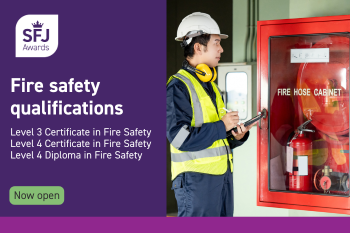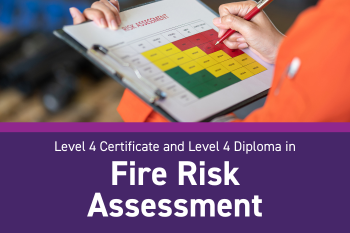For Pete, the best part of his apprenticeship has been the people – “easily the best part of my experience has been the people – both within the fire service and within the wider community.” Apprenticeships offer real-life learning, with training on and off the job, and, especially for public service sectors, this means that apprentices are rarely short of new people to meet and learn from.
Explore Fire Service Qualifications
We offer a wide range of training for individuals, teams, and employers across fire and rescue, including fire safety, fire prevention, and much more.
Explore Qualifications
Every year in England, around 300,000 people begin an apprenticeship and the routes into this type of earn-as-you-learn training are highly varied. Some enrol straight from school or college, and some join slightly later, making use of their apprenticeship to switch career paths. In 2019/20 in England, around half of all new apprentices were over the age of 25. This is Pete’s second apprenticeship. His first apprenticeship was in vehicle repair, which he began when he left school aged 16. He says, “I continued my vehicle repair career for 24 years until I was aged 41. This was when I joined the fire service as an apprentice after a close friend sign-posted the opportunity to me. It’s going well so far and the apprenticeship route to developing new skills is definitely a type of training that has worked well for me”.
Apprenticeships require hard work, commitment and an ability to balance independent study with work during portions of the week that are allocated for off-the-job training. Pete’s chosen apprenticeship typically takes around 24 to 30 months to complete. Alongside time allocated for independent learning, Operational Firefighter Apprentices gain real-life experience tackling a wide range of emergencies, such as fires, searching, rescuing and protecting people and animals. Many also provide advice and guidance on fire prevention to members of the public, including school pupils and those deemed to be at greater risk. Pete says, “From the learning opportunities, the operational incidents, through to the community interaction, I am thoroughly enjoying every aspect of my apprenticeship training and my new career working for Leicestershire Fire and Rescue Service. I have been learning so many new skills, such as the use of breathing apparatus, how to handle road traffic collisions, how to administer trauma care, and the best ways of using fire service equipment”.
Preparing for End-Point Assessment as an Operational Firefighter
Pete still has lots of time before he takes his End-Point Assessment but he has started thinking about how to prepare. All apprentices in England must successfully complete their End-Point Assessment to qualify. Pete says, “I’m currently assembling my portfolio of evidence, which must be submitted as part of the final assessment. I also have a plan to prepare using literature provided to us through an online system and by rehearsing aspects of what I’ll be marked on with members of my team”. Apprentices are not alone in their preparations, employers are well-placed and offered guidance from organisations like SFJ Awards so that they are able to, in turn, support their apprentices, especially in the final run-up towards their End-Point Assessments.
End-Point Assessment FAQs
Explore our frequently asked questions to learn about the End-Point Assessment for Operational Firefighters in England
Learn moreHowever, looking to the future beyond the End-Point Assessment, Pete is excited about continuing to learn more about his new career as a firefighter once he has completed his training – “My plan for the next few years, at least, is to continue to learn and hone my skills. Ultimately, I’d like to become qualified to drive the fire appliances and to use specialist appliances. There is a clearly defined path of career progression for firefighters, which interests me for the future”.
Employer motivations for apprenticeships
When asked about their motivations for offering apprenticeships, around half of all employers say they are a fantastic way to secure new talent for their organisation. Once trained up, many employers are keen to see apprentices become permanent members within their teams. In England, in 2019/20, 62% of employers that had recruited apprentices in the last three years retained at least one apprentice into a permanent contract once they had finished their apprenticeship programme making them an ideal way to get a foot on the ladder within a new sector.
- https://researchbriefings.files.parliament.uk/documents/SN06113/SN06113.pdf
- National Fire Chiefs, www.nationalfirechiefs.org.uk/Apprenticeship
- Institute for Apprenticeships and Technical Education, www.instituteforapprenticeships.org/apprenticeship-standards/operational-firefighter-v1-2
- National Careers Service, https://nationalcareers.service.gov.uk/job-profiles/firefighter
- https://assets.publishing.service.gov.uk/government/uploads/system/uploads/attachment_data/file/936491/ESS_2019_Apprenticeships_Thematic_Report_Nov20.pdf





